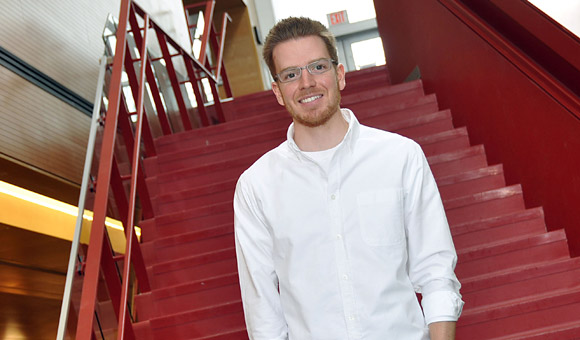
Master of Science student Graeme Koelwyn
UBC Human Kinetics Assistant Professor Neil Eves and Master of Science student Graeme Koelwyn are conducting research that examines the heart and blood vessel function in breast cancer survivors who have received anthracycline chemotherapy.
“In breast cancer, specifically, an increasing number of people are surviving because treatments are getting better and doctors are catching it earlier,” says Koelwyn. “But due to the nature of these treatments there may also be a growing number of people who experience post-treatment complications.”
Anthracyclines are some of the most effective anti-cancer treatments developed, but do potentially produce secondary effects in some patients.
“It is well known that anthracycline chemotherapy may affect the heart during or after treatment, but we have a minimal understanding of how it affects the blood vessels or the relationship the blood vessels have to the heart,” says Eves, an exercise physiologist. “If we can better understand this, we can potentially help breast cancer survivors live longer, healthier lives.”
Working with Dr. Susan Ellard of the BC Cancer Agency, Eves and Koelwyn will be collecting data over the next few months by conducting measurements of blood vessel and heart function at rest and during exercise in individuals who previously received anthracycline chemotherapy after being diagnosed for breast cancer.
The research team will examine the behavior of blood vessels and how they may affect heart function in these breast cancer survivors, and compare the findings to people of the same age who have not been affected by cancer.
Their hope is to identify whether any earlier changes in blood vessel function that may be related to receiving anthracyline treatment can be detected before more potentially major changes in heart function occur. If there is a connection, the research may help predict cardiovascular risks in breast cancer survivors before any problems or complications occur.
“If, during the data analysis, we find some kind of difference exists in the blood vessels of breast cancer survivors from the average population — or if we can detect specific changes happening — future work will focus on designing more optimal exercise programs and lifestyle interventions for the growing number of breast cancer survivors, with the goal of improving the overall health after chemotherapy treatment,” says Koelwyn.
The project is supported by the Faculty of Health and Social Development Bill Tymchuk Cancer Research Award. Koelwyn was awarded a $17,500 Canadian Institutes of Health Research Frederick Banting and Charles Best Canada Graduate Scholarship in the 2010/2011 academic year to conduct the research.
— 30 —